Breakthrough in Alzheimer’s Treatment
Researchers from Spain have announced exciting results from preclinical studies involving a new experimental drug for Alzheimer’s disease. The drug, WIN55.212-2, demonstrated remarkable effects in reversing cognitive decline in rats suffering from early-stage Alzheimer’s disease. These findings raise hope for future treatments for the millions affected by this neurodegenerative disorder.
The Mechanisms Behind Alzheimer’s
For years, scientists have studied brain tissue from individuals who passed away due to Alzheimer’s disease, uncovering crucial insights into its progression. They identified that two primary systems—the cholinergic system, which regulates memory and learning, and the cannabinoid system—play critical roles in the disease’s development. Initially, the cholinergic system becomes impaired, disrupting memory, and as the disease progresses, the cannabinoid system is also affected.
WIN55.212-2: A Promising Treatment
WIN55.212-2 targets these two systems, leading to significant improvements in cognitive function. In the preclinical models, rats treated with the drug showed remarkable cognitive recovery, even achieving cognitive test scores similar to healthy rats. The researchers observed an increase in the activity of both the cholinergic and cannabinoid systems at the molecular level. The drug also boosted the synthesis of cholinergic receptors, which are essential for acetylcholine production—a neurotransmitter vital for memory and learning.
These results suggest that WIN55.212-2 could become an important tool in treating Alzheimer’s disease, particularly in its early stages. While researchers are confident in the drug’s potential at this stage, they aim to continue their studies to evaluate its effectiveness in treating more advanced stages of the disease. Future clinical trials will assess its safety and therapeutic value for human patients.
Alzheimer’s Experimental Drug: Future Outlook
The researchers’ work offers new hope for Alzheimer’s treatment, especially for patients in the early stages of the disease. While WIN55.212-2 has shown remarkable promise in preclinical trials, the next step will involve further testing to ensure its safety and efficacy in human clinical trials. This research could pave the way for more effective treatments that can improve the quality of life for Alzheimer’s patients.
Moreover, a recent study conducted by another team of researchers revealed that men with dementia have a lower life expectancy compared to women, highlighting the importance of early diagnosis and intervention for this growing global health issue.






